Last of Us: Left Behind has the best broken world in video games: here's why
Video games often drop the ball when creating dystopias. While broken worlds have become commonplace in games, there is frequently a fundamental misunderstanding of what makes a dystopia interesting. Many games happily pilfer the intrinsic brutality and blighted landscapes, but skimp on the rhyme and reason, the social commentary and--most crucially--the intimate human stories that make this kind of fiction so compelling.
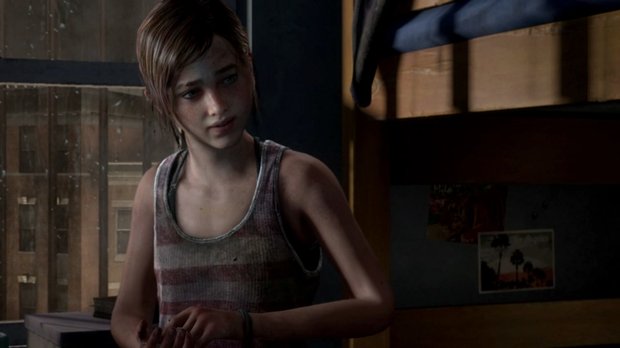
2013’s The Last of Us bucks this trend by offering up a vivid journey across a United States devastated by a fungal plague that turns humans into hyper-aggressive attack dogs, keeping us gripped with a human tale that thoroughly curb-stomps our hearts. Yet the demands of gameplay and linearity mean it sometimes misses the opportunity to fully develop aspects of its broken world. Standalone story DLC Left Behind feels like a direct answer to these moments, picking up themes introduced in The Last of Us and running with them in a way that the main game couldn’t. Left Behind helps to realise the true potential of this gaming’s most powerful dystopia.
The greatly reduced scope of the DLC puts a tight focus on human perspective. It’s essentially a flashback to a time when Ellie and her friend Riley explored a dilapidated shopping mall together. In contrast to the feral wastes of the United States it’s a small, singular setting, but incredibly richly realised and dense with things to find. We’re able to explore it largely at our leisure, a luxury we often weren’t afforded in the main game. Through Ellie and Riley the mall takes on tremendous meaning. We learn so much simply wandering around and seeing how these teenagers, born after the plague, interact with this relic of the past. The mall becomes a microcosm that speaks volumes about the wider dystopia.
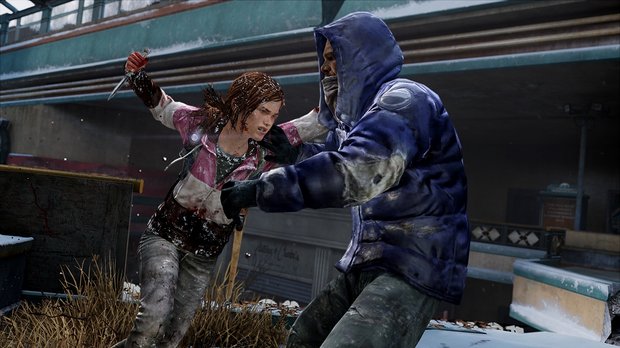
As the teenagers interact with it the mall acts as a bridge between an evaporated past, the unforgiving present and--perhaps--a hopeful future. It boils down the juxtapositions prevalent in The Last of Us to their purest form, allowing us to easily tease out the truth of this broken world. The mall is entirely familiar to us, but to these girls it is practically an alien landscape. They marvel at our materialism and struggle to comprehend our self-involved frivolity, and yet it makes them achingly aware of a life they have missed out on. By exploring this place in their shoes we can truly comprehend what has been lost.
A dystopia is only given meaning by the people within it. It doesn’t matter if it was caused by a zombie infection, an exploding sun, or dolphins waging war on us from the ocean. Any such contrivance only makes sense in light of how humans have adapted, and at what cost. The Last of Us often delivers this admirably, but a lengthier story means story beats occasionally pull the focus away too quickly. Left Behind’s tight setting and emphasis on exploration means it never loses sight of the humans at its heart.
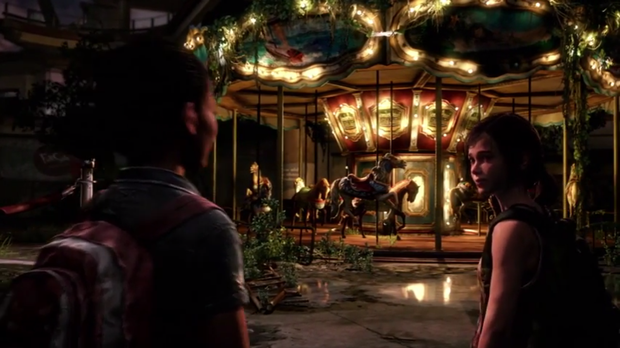
This even extends as far as the gameplay itself, the familiar shooting mechanics subverted to tie them more closely to the central themes. Previously reserved for taking lives, here they’re used for a water gun fight between friends, for play. It provides stark contrast when violent combat inevitably returns. These are teenagers who should be messing around in arcades and insulting each other with Magic 8-Balls. But now it is only play-acting before the reality of this world catches up with them. It shows us that the human toll of this dystopia is laughter, and innocence, and friendship. The mall, where a teenage girl should be right at home, strips Ellie of her youth. It transforms her from a normal person to someone exceptional, the future of the world thrust upon her shoulders--whether she knows it or not.
The Last of Us has similar moments but spreads them a little more thinly, the demands of a larger, longer story meaning we aren’t always given time to appreciate them. There’s the tragic tale of Ish, related through a series of increasingly desperate notes as you explore a sewer system. This grimy setting is given haunting resonance by what we discover; the smallest details, like locked doors or dark splatters, are suddenly able to tell us a huge amount not only about the plight of these survivors, but the plight of humanity more widely. It’s telling that many campaigned for this DLC to deliver Ish’s story, suggesting that it would benefit from the focus of Left Behind.
Weekly digests, tales from the communities you love, and more
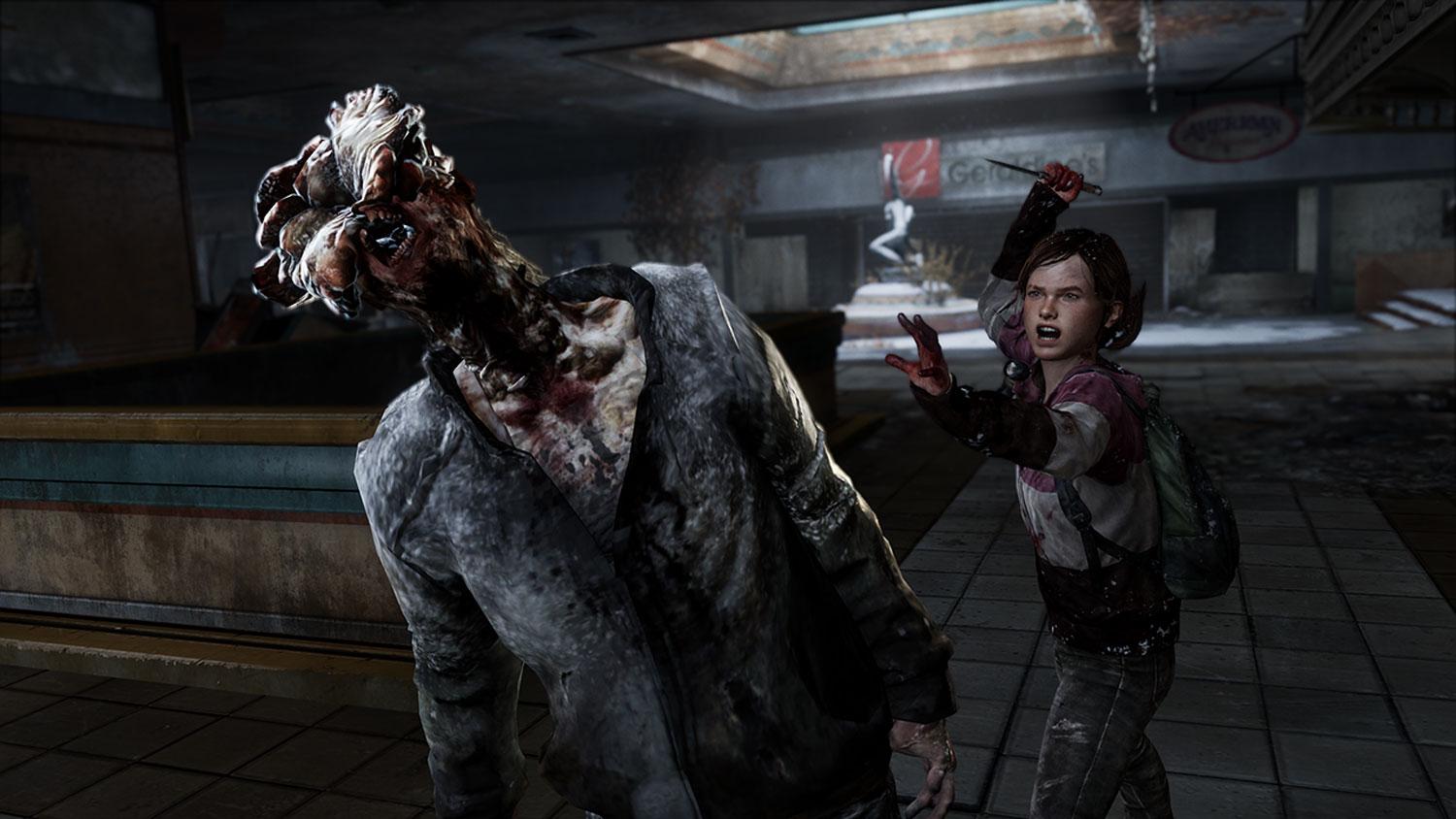
There’s also a moment just after the opening of the game, when we’re able to walk around a military encampment. We see the patrols of shadowy guards, the paranoia of infection and the door-to-door executions, the black market and back alley dealings. It shows us how this specific disaster has reshaped society and human lives. It feels like we could have learned so much more here if this sequence was given the freedom and focus of Left Behind.
The sequence from The Last of Us that would perhaps benefit most from being imbued with Left Behind’s individual sense of depth comes late in the game when Ellie is abducted by David, the leader of a large settlement that has somehow built itself into a working society. As soon as we meet him he is clearly a bad guy. He's got a creepy stare and a reedy voice. Neither he, nor his society, is ever able to become much more than this. There is a suggestion that these people are only trying to survive, and that perhaps David is really no worse than Joel and the things he has done to protect Ellie. David could be representative of the moral dilemma of compromise, how humans have lost their humanity. But there isn’t much chance to ponder this for ourselves. Instead he is reduced to by-words for evil: murderer, cannibal, paedophile. These make the comparisons between him and Joel far less meaningful.
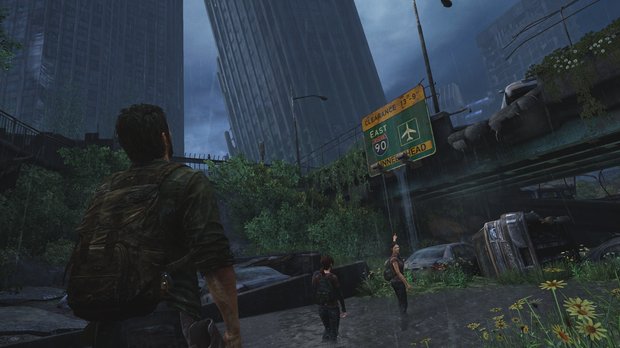
As soon as Ellie escapes the alarm is raised and the civilians evacuated. The town becomes another battlefield. We could learn so much about the game’s dystopia if we were given the chance to see how this society works, to meet the locals and hear their stories, to explore and uncover the evil for ourselves. Instead we’re forced to leave it behind us in flames.
When Left Behind was revealed there was a section of fans concerned that it would be a needless addition, that it threatened to undermine what The Last of Us had achieved. Naughty Dog’s creation singlehandedly altered the perception of what a video game dystopia could achieve. Against the odds, Left Behind has distilled that into near perfection.



